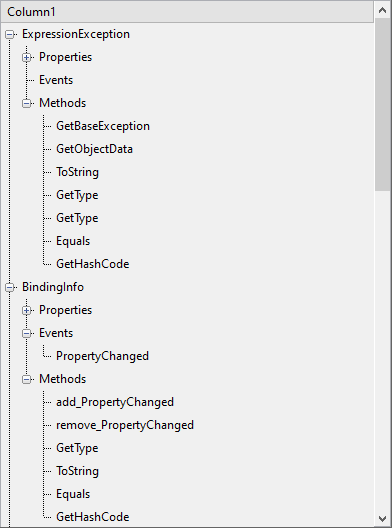Load-On Demand
Users can use a technique called "delayed loading" where nodes are populated on demand when the user expands them. This allows the application to load faster and use resources more efficiently. The Load-On demand is an excellent alternative over fully populating each node when the application starts.

The implementation below uses the event hander Expanding event, so that users can populate the node they try to expand it. In the code snippet below, we have saved the information we need to populate the node in the Tag property. Also, we add a dummy child node so the user will be able to expand this node and trigger the Expanding event that will populate the node.
Let's see how to implement the on-demand loading in TreeView, using the following code snippet:
Private Sub Form1_Load(sender As Object, e As EventArgs) Handles MyBase.Load
' Remove items if any added at design time
Me.C1TreeView1.Nodes.Clear()
'Add first two levels of nodes to create a basic structure of TreeView
' Scan every type in the assembly
For Each t As Type In Me.C1TreeView1.GetType().Assembly.GetTypes()
If t.IsPublic AndAlso Not t.IsSpecialName AndAlso Not t.IsAbstract Then
' Add node for this type
Dim node As C1TreeNode = New C1TreeNode()
node.SetValue(t.Name)
' Save information needed to populate the node
node.Tag = t
Me.C1TreeView1.Nodes.Add(node)
' Add subnodes for properties, events, and methods
node.Nodes.Add(CreateMemberNode("Properties", t, MemberTypes.Property))
node.Nodes.Add(CreateMemberNode("Events", t, MemberTypes.Event))
node.Nodes.Add(CreateMemberNode("Methods", t, MemberTypes.Method))
End If
Next
'Handle the Expanding event to add nodes on demand
AddHandler Me.C1TreeView1.Expanding, AddressOf Me.C1TreeView1_Expanding
End Sub
'Creating and adding a node to TreeView
Private Function CreateMemberNode(ByVal header As String, ByVal t As Type, ByVal memberTypes As MemberTypes) As C1TreeNode
' Create the node
Dim node As C1TreeNode = New C1TreeNode()
node.SetValue(header)
' Save information needed to populate the node
node.Tag = memberTypes
' Add a dummy node so this node can be expanded
node.Nodes.Add(New C1TreeNode())
node.Expanded = False
' Finish
Return node
End Function
Private Sub C1TreeView1_Expanding(sender As Object, e As C1TreeViewCancelEventArgs) Handles C1TreeView1.Expanding
' Get the node that fired the event
Dim node As C1TreeNode = TryCast(e.Node, C1TreeNode)
If node.Level <> 0 Then
' Remove dummy node
node.Nodes.Clear()
' Populate the node
Dim type As Type = CType(node.ParentCollection.Parent.Tag, Type)
Dim memberTypes As MemberTypes = node.Tag
Dim bf As BindingFlags = BindingFlags.Public Or BindingFlags.Instance
For Each mi As MemberInfo In type.GetMembers(bf)
If mi.MemberType = memberTypes Then
If Not mi.Name.StartsWith("get_") AndAlso Not mi.Name.StartsWith("set_") Then
Dim item As C1TreeNode = New C1TreeNode()
item.SetValue(mi.Name)
node.Nodes.Add(item)
End If
End If
Next
End If
End Subprivate void Form1_Load(object sender, EventArgs e)
{
// Remove items if any added at design time
c1TreeView1.Nodes.Clear();
//Add first two levels of nodes to create a basic structure of TreeView
// Scan every type in the assembly
foreach (Type t in c1TreeView1.GetType().Assembly.GetTypes())
{
if (t.IsPublic && !t.IsSpecialName && !t.IsAbstract)
{
// Add node for this type
C1TreeNode node = new C1TreeNode();
node.SetValue(t.Name);
// Save information needed to populate the node
node.Tag = t;
c1TreeView1.Nodes.Add(node);
// Add subnodes for properties, events, and methods
node.Nodes.Add(CreateMemberNode("Properties", t, MemberTypes.Property));
node.Nodes.Add(CreateMemberNode("Events", t, MemberTypes.Event));
node.Nodes.Add(CreateMemberNode("Methods", t, MemberTypes.Method));
}
}
//Handle the Expanding event to add nodes on demand
c1TreeView1.Expanding += c1TreeView1_Expanding;
}
//Creating and adding a node to TreeView
C1TreeNode CreateMemberNode(string header, Type t, MemberTypes memberTypes)
{
// Create the node
C1TreeNode node = new C1TreeNode();
node.SetValue(header);
// Save information needed to populate the node
node.Tag = memberTypes;
// Add a dummy node so this node can be expanded
node.Nodes.Add(new C1TreeNode());
node.Expanded = false;
// Finish
return node;
}
private void c1TreeView1_Expanding(object sender, C1TreeViewCancelEventArgs e)
{
// Get the node that fired the event
C1TreeNode node = e.Node as C1TreeNode;
if (node.Level != 0)
{
// Remove dummy node
node.Nodes.Clear();
// Populate the node
Type type = (Type)node.ParentCollection.Parent.Tag;
MemberTypes memberTypes = (MemberTypes)node.Tag;
BindingFlags bf = BindingFlags.Public | BindingFlags.Instance;
foreach (MemberInfo mi in type.GetMembers(bf))
{
if (mi.MemberType == memberTypes)
{
if (!mi.Name.StartsWith("get_") && !mi.Name.StartsWith("set_"))
{
C1TreeNode item = new C1TreeNode();
item.SetValue(mi.Name);
node.Nodes.Add(item);
}
}
}
}
}Note: The latest WinForms .NET Edition does not include rich design-time support yet. We will enhance it in future releases.


